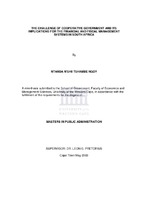| dc.contributor.advisor | Pretorius, Leon G. | |
| dc.contributor.author | Ngoy, Ntanda N'shii Tshambe | |
| dc.contributor.other | School of Government | |
| dc.date.accessioned | 2014-03-28T09:30:16Z | |
| dc.date.available | 2013/06/11 | |
| dc.date.available | 2013/06/11 12:44 | |
| dc.date.available | 2014-03-28T09:30:16Z | |
| dc.date.issued | 2009 | |
| dc.identifier.uri | http://hdl.handle.net/11394/3064 | |
| dc.description | Masters in Public Administration - MPA | en_US |
| dc.description.abstract | Can a country function without a legislative framework able to inform decisionmaking processes taken at different spheres of government? To what extent would actions conducted at various spheres of government be efficiently coordinated and informed by appropriate channels of constitutional provisions and legislative amendments to consolidate financial and intergovernmental fiscal relations policy-making tools for the realization of an efficient local developmental state? Answers to the above mentioned two questions refer to normative fiscal policy principles and prescriptive instruments of intergovernmental fiscal transfer design, whose orientation suggests better ways of framing sound and coherent programs and interventions that strengthen cooperative synergy and transfer knowledge of experience gained in empirical investigations and various South African environments of higher academic learning. Growing evidence acknowledges South Africa as one of the young democratic countries that has been going through a period of transition over the past three years as it changes its system of public finance from a structure suited to the old apartheid system to one consistent with the new South African Constitutional dispensation. While the former system was highly centralized, the newconstitution makes a clear commitment to municipal governments as important providers of government services, with greater tax and spending powers. Even as local autonomy has been substantially increased, there remains uncertainty as to the most appropriate design of a system of intergovernmental fiscal grants to metropolitan areas and townships. This study analyses this situation and further develops a generic design for intergovernmental transfers and its suitability to the realities of South African municipalities on the ground within the framework of Cooperative Government. This study concludes that fiscal management, as a cross-cutting discipline, is a powerful instrument for government’s revenue sources at the national, provincial and local government levels. Financial management should be regarded as a co-coordinating mechanism managing government’s expenditure and catalyzing sound financial relationship for an efficient management in the country, thus allowing government to budget effectively for the delivery of goods and services in order to attain the constitutional mandate of a developmental state. | en_US |
| dc.language.iso | en | en_US |
| dc.publisher | University of the Western Cape | en_US |
| dc.subject | Budgets | en_US |
| dc.subject | Conditional grant | en_US |
| dc.subject | Cooperative government | en_US |
| dc.subject | Division of revenue | en_US |
| dc.subject | Equitable share | en_US |
| dc.subject | Financial and Fiscal Commission (FFC) | en_US |
| dc.subject | Financial management | en_US |
| dc.subject | Fiscal policy | en_US |
| dc.subject | Intergovernmental Financial and fiscal management systems | en_US |
| dc.subject | South Africa | en_US |
| dc.title | The challenge of cooperative government and its implications for the financial and fiscal management systems in South Africa | en_US |
| dc.rights.holder | Copyright: University of the Western Cape | en_US |
| dc.description.country | South Africa | |

